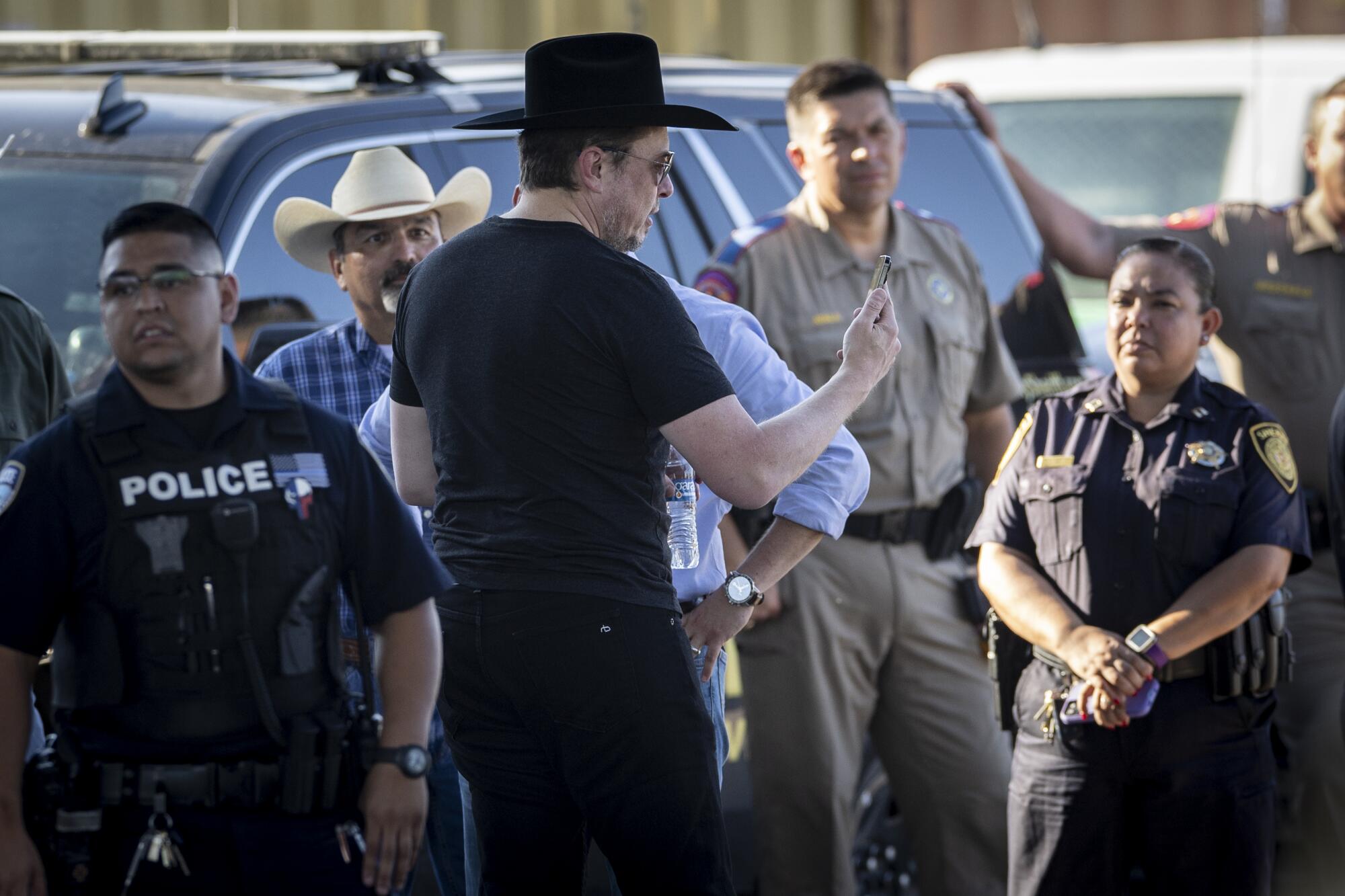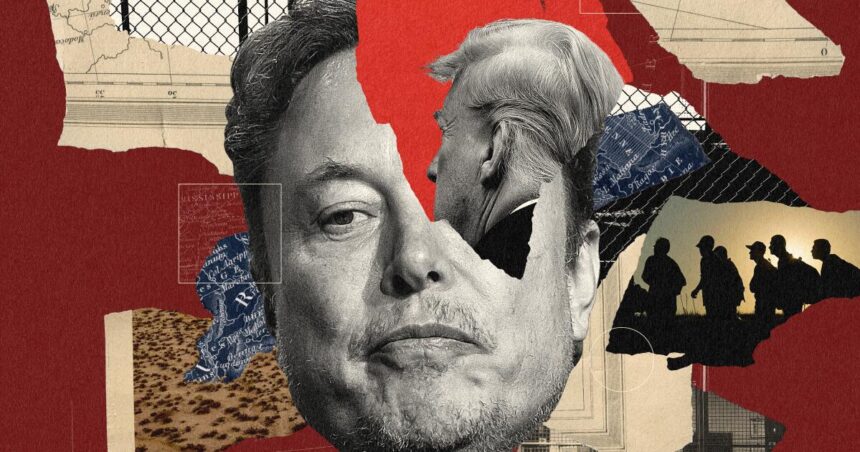Elon Musk and his brother Kimbal were talking to many business leaders in 2013 about creating their first company when the conversation seemed off-script. Originally from South Africa, Kimbal said the brothers did not have legal immigration status when they started their business in the US.
“In fact, when they funded us, they knew we were illegal immigrants,” Kimbal said, according to a recording of the interview from the Milken Institute Global Conference.
“I would say it’s a gray area,” Elon replied with a laugh.
Eleven years later, Elon returned to the Milken Institute last month in Beverly Hills, speaking again on immigration. This time, he described the southern border as a scene from a zombie apocalypse and said the legal immigration process was long and “Kafkaesque.”
“I’m a big believer in immigration, but having unvetted immigration on a large scale is a recipe for disaster,” Musk said at the conference. “So I’m very much in favor of speeding up legal immigration but having a secure southern border.”
Musk, the most financially successful immigrant in the U.S. and the world’s third-richest person, has often repeated his view that it is difficult to immigrate to the U.S. legally but “trivial and quick” to enter illegally. What’s left out: Seeking asylum is a legal right under national and international law, regardless of how someone arrived on US soil.
But as the election year escalated and Republicans made border security a central theme of the campaign, Musk’s comments on immigration grew more extreme. The chief executives of SpaceX and Tesla, who bought the social media platform X (formerly Twitter) in 2022, sometimes use the giant microphone to raise racist conspiracies and spread misinformation about immigration laws.
Musk’s business manager did not respond to requests for comment, as did representatives for SpaceX and Tesla. X does not have a department that responds to news media inquiries.
While Musk’s vision is clear, murkier is its impact. Some see him as an influential opinion maker with the power to shape policy and sway voters, while others dismiss him as the kind of social media bomb thrower usually heard in conservative echo chambers.
“If you haven’t heard, I’m sure you’ll see members of Congress mention Elon Musk and point to his tweets, and that’s a scary concept,” said Rep. Nanette Diaz Barragán (D-San Pedro) ), who leads the Congressional Hispanic Caucus.
He said Musk has influence with his fellow Republicans who are “always looking for new anti-immigrant points.”
Polls show immigration is a top issue for voters. For the third month in a row, it was named by respondents to an open April Gallup poll as the most important issue facing the US.
The November election that will be a rematch between President Biden and former President Trump will be the first presidential contest since Musk bought X – a site that Trump had banned for inciting violence before Musk reinstated his account last year.
Musk used the platform to defend Trump last week after the former president was convicted of falsifying records in a hush money scheme. “Great damage was done today to public confidence in the American legal system,” Musk wrote on X, calling Trump’s crimes “trivial.”
After meeting with Trump in March, Musk to former CNN anchor Don Lemon that he is “leaning” from Biden, but does not plan to endorse Trump. He also said he would not donate to the presidential campaign.
Campaign contribution records show Musk regularly donated to both Republicans and Democrats through 2020. These include several donations to California Governor Gavin Newsom, who he says has a relationship with Musk dating back to his time as mayor of San Francisco, but he has never discussed it. immigration.
“I think people have formed very strong opinions on this topic,” Newsom said. “I don’t know that they’re influencing the debate in a disproportionate way. No human being has ever said, ‘Hey, did you see Elon’s immigration thing?’
How Musk talked about immigration in X
Last year Musk opened Eagle Pass, Texas, bordermeeting with local politicians and law enforcement to get the so-called “unfiltered” view of the situation.
He is too help spread viral reports claims the Biden administration has “secretly” flown hundreds of thousands of migrants to the US to reduce border arrivals.
“This administration is both importing voters and creating a national security threat from unvetted illegal immigrants,” Musk said wrote March 5 in X. “It’s very possible that the groundwork is being laid for something worse than 9/11.”
But the migrants are flying commercially under a program created by the Biden administration, using the president’s authority to temporarily admit people for humanitarian reasons. The program allows up to 30,000 vetted people from Cuba, Haiti, Nicaragua and Venezuela to legally immigrate to the US each month and obtain work permits if they have financial sponsorship.
Contrary to Musk’s claim that the administration is looking for Democratic voters, those who come to the program have no path to citizenship. Such claims provide fuel for extremist ideologies such as great replacement theorya racist conspiracy in which there is a plot to reduce the white population.

Elon Musk, wearing a black Stetson hat, livestreams while visiting the southern border in September in Eagle Pass, Texas. Musk visited the border along the Rio Grande with Rep. Tony Gonzales (R-Texas).
(John Moore/Getty Images)
Earlier this year, Musk targeted a controversial bill in the California Legislature that will help immigrants with serious or violent crime convictions against deportation using state funds. Assemblyman Reggie Jones-Sawyer (D-Los Angeles) pulled the bill after Republicans slammed it on social media, getting Musk’s attention, who wrote about X: “When is enough?”
In February, shortly after a bipartisan group of senators released details of the long-negotiated border security bill, Musk again echoed his theory of a good replacement, write in X: “The long term goal of the ‘Border Security’ bill is to allow illegals to vote! This will do the total opposite of securing the border.
Sen. James Lankford (R-Okla.) was taken back.
“No, it’s not focused on trying to be able to get more illegal to vote,” Lankford said on CNN. “That doesn’t make sense.”
Musk’s immigration journey
There is a certain irony in Musk attacking a program that allows limited arrivals for humanitarian reasons while simultaneously speaking in favor of legal immigration, said Ahilan Arulanantham, a lawyer, professor and co-director of the Center for Immigration Law and Policy at UCLA. The program offers potential migrants a legal path to reach the US and reduces arrivals at the border from beneficiary countries.
“It shows a lot of confusion about a fairly basic point about immigration law and how that policy works,” Arulanantham said. Musk’s lack of criticism of similar programs for Ukrainians reflects an undercurrent of racism that accompanies attacks on programs for Latin American migrants, he added.
Musk’s inflated false claims are counterproductive to rational immigration policy, Arulanantham said.
“Each sound adds to the stack, and the louder the sound, the more additions to the stack,” Arulanantham said. “He’s very loud.”
David Kaye, a UC Irvine law professor who studies platform moderation, said that Musk’s promotion of false or false statements, including about immigrants, is because he can influence the conversation on X in a way that no one else can.
“There’s already a very strong alarmist approach to immigration, so Musk can only add a little fuel to a very big fire,” Kaye said. “But the fact is that he has a lot of followers. To the extent that he promotes disinformation, I think it’s a concern for the United States to have a fair and based debate on immigration.
Musk’s own immigration story is described in the biography “Elon Musk” by Walter Isaacson. Musk left South Africa in 1989 for Canada, where his mother had siblings, Isaacson wrote. During college he transferred to the University of Pennsylvania and, after graduating, enrolled at Stanford but immediately requested a deferral.
He and his brother Kimbal had invented an interactive network directory service, like a precursor to Google Maps.
Before presenting the idea to the venture company, Kimbal was stopped by US border officials at the airport when he returned from a trip to Toronto “who looked through his suitcase and saw the deck, business cards and other documents for the company. Because he did not have a US work visa, they did not allow him to he boarded the plane,” Isaacson wrote in the book. So a friend picked him up and brought him to the US after telling another border agent that he saw David Letterman’s show.
After completing the investment, the company found an immigration attorney to help the Musk brothers obtain work visas, according to Isaacson.
After Musk married his first wife, he became eligible for US citizenship, and took the oath in 2002 at the Los Angeles County Fairgrounds.
Musk’s recent comments on immigration and other political issues appear to be a reversal from his views a decade ago, said Nu Wexler, who has worked in policy communications at tech companies and congressional Democrats.
Wexler remembers when Musk leave Fwd.us, a political action organization led by Meta Chief Executive Mark Zuckerberg in 2013 to advocate for immigration reform. Musk left because Fwd.us supports conservative lawmakers who want immigration reform but support oil drilling and other policies that run counter to Musk’s environmental priorities.
“I agreed to support Fwd.us because there is a genuine need for immigration reform. However, this should not be done for other important reasons,” Musk told the AllThingsD news site at the time.
When Zuckerberg created Fwd.us, it made smart business sense for tech executives to make a business case for immigration reform, Wexler said. Now, immigration is a more divisive issue and executives on the left are less willing to dive into politics.
“At some point, he decided that being the main character was a worthwhile personal brand,” Wexler said of Musk. “I don’t know if he’s going to change his mind on immigration, even if he can burn down the base.”
Alex Conant, a GOP consultant and partner at public affairs firm Firehouse Strategies, said Musk’s influence could grow if Trump wins the election. If an immigration bill were to pass at that time, Musk’s endorsement or rejection could shape the debate, he said.
“It’s a scenario where all of a sudden they can have power,” he said.
There seems to be a lot of evidence for that possibility. Trump and Musk have discussed a possible advisory role for the billionaire, the Wall Street Journal reported last week. If Trump reclaims the White House, Musk could provide formal input on border security policy.
Times staff writer Taryn Luna contributed to this report.




